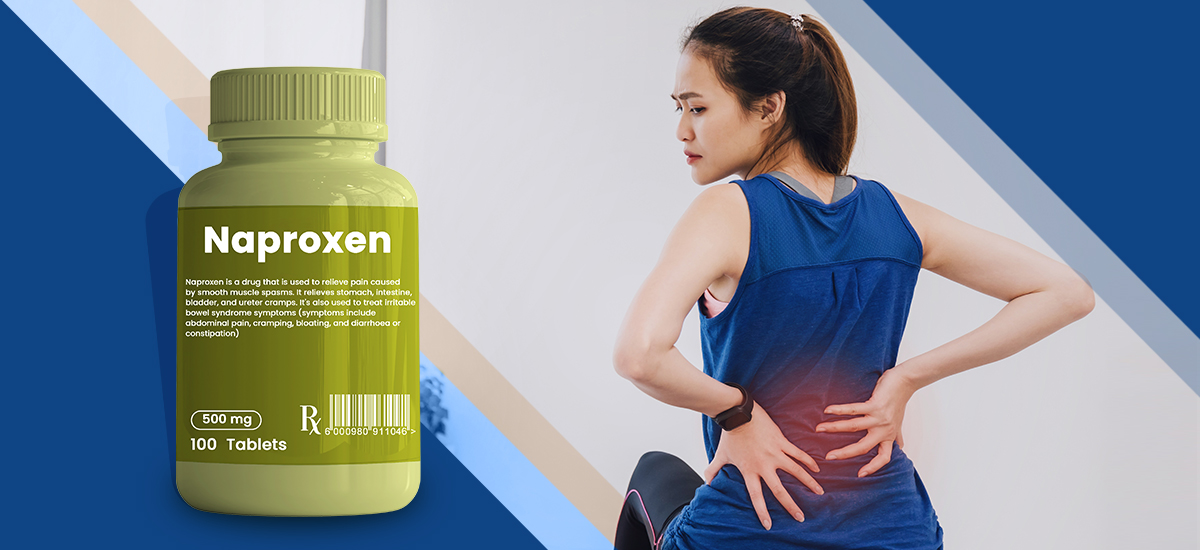Naproxen is a pain reliever to treat illnesses like arthritis, ankylosing spondylitis, tendinitis, bursitis, gout, and menstrual cramps. It can also treat acute pain caused by disorders that aren't covered in this drug guide.
Over-the-counter Naproxen is sold under the brand name Aleve. you can also buy Aleve onine from trusted certified pharmacy.
Does Naproxen help with Pain Relief?
Yes, Naproxen is used to treat headaches, muscle aches, tendonitis, tooth pain, and menstrual cramps, among other things. It also helps to relieve the pain, swelling, and stiffness associated with arthritis, bursitis, and gout episodes (Todd, P.A. and Clissold, S.P., 1990).
Scientific Study on the Effectiveness of Naproxen
Pain after surgery is frequently mismanaged. A variety of pharmacological therapy is available, including non-steroidal anti-inflammatory medications (NSAIDs), of which Naproxen is one. Naproxen is used to treat a wide range of painful disorders, including acute postoperative pain, and is frequently coupled with sodium to increase its oral solubility.
The objective of this study was to see how effective, safe, and long a single oral dose of Naproxen or naproxen sodium was at treating immediate postoperative pain in adults.
Naproxen 200 mg and naproxen sodium 220 mg, according to two small trials, may give good postoperative pain management. When compared to placebo, there was no significant difference in the number of patients who experienced an adverse event while on therapy.
Forms and Strength of Naproxen
Naproxen is available in tablet, liquid capsule, and liquid form. The amount of Naproxen required is dictated by the reason for taking the medication.
Naproxen is available in a range of strengths and formulations. There are three main strengths of naproxen tablets: 250 mg, 375 mg, and 500 mg. Naproxen sodium is available in OTC capsules and tablets with a dose of 220 mg, as well as prescription pills with doses of 275 mg and 550 mg.
Low-dose Naproxen is available in pill or capsule form. Children and those who have difficulty swallowing tablets can use naproxen suspension. Each milliliter of Naproxen suspension contains 25 milligrams of the medication (ml) (Musa, K.A. and Eriksson, L.A., 2008).
Dosage
If you have a fever, you should only use OTC naproxen for 3–5 days for the pain and no longer than three days if you have a fever. If people need to continue treatment, they should first see their doctor.
For children aged 2–12 years, the maximum daily dose is 20 mg/kg. In a 24-hour period, they should not consume more than 1,000 mg. In a 24-hour period, children aged 12 and up should not ingest more than 660 mg of OTC medications.(Bliss, C.I., 1935)
How Naproxen works
These drugs operate by preventing your body from manufacturing prostaglandins, which are responsible for reducing pain and temperature. When your body's tissues are damaged, your body produces prostaglandins.
These molecules are responsible for many of the symptoms of inflammation, including swelling, fever, and discomfort. Prostaglandin synthesis inhibition can help you prevent pain and other inflammatory side effects. It does, however, have the potential to cause problems with other functions (Roshandel, M.R., 2021).
Side Effects of Naproxen
If you exhibit symptoms of an allergic response to Naproxen, get immediate medical attention: sneeze, runny, or stuffy nose; wheezing or difficulty breathing; hives; swelling of the cheeks, lips, tongue, or throat.
Get emergency medical help if you have chest discomfort that spreads to your jaw or shoulder, numbness or weakness on one side of your body, slurred speech, or shortness of breath.
- stomach ache
- constipation
- dizziness
- drowsiness
- headache
- heartburn
- nausea and vomiting, as well as abdominal hemorrhage
- perforation of the abdomen
- lightheadedness
- ulceration in the stomach
- retaining fluid
- diarrhea
These adverse effects can be fatal and come on suddenly. If you get severe stomach pain while taking Naproxen, stop using it right once and see your doctor. To limit the risk of digestive system side effects, use the lowest effective dosage for the shortest time.
Blood pressure has been shown to rise when using Naproxen. There's a chance you won't notice any signs that your blood pressure is rising. Furthermore, if you already have high blood pressure, Naproxen could make it worse. Before taking Naproxen, talk to your doctor if you have high blood pressure.
Drug Interactions
Some drugs can interfere with Naproxen's effectiveness. If you use any of the following, tell your doctor:
- Digoxin
- Cholestyramine
- Cyclosporine
- Lithium
- Methotrexate
- Blood pressure medicine
- Blood thinner
- Diuretic
- Medicine to treat depression
- Probenecid
- Sucralfate
- Antacids
Unless your doctor says it's acceptable, don't take any additional NSAIDs. Aspirin, celecoxib, diclofenac, diflunisal, ibuprofen, and salsalate are some of the NSAIDs. Do not consume alcohol while taking this medication (Moore, N., Pollack, C. and Butkerait, P., 2015).



 03 Jan 2022
03 Jan 2022


